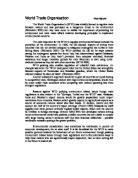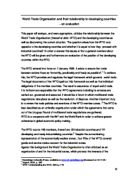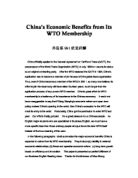The key clause of that statement relates to growth. More than 75% of the WTO membership is made of developing or least developed countries. To this end, all contracts contain exclusive provisions for them, which help to enhance their potential for growth and development. Examples of these provisions include longer times to implement agreements and commitments to agreements, measures undertaken to ameliorate trading opportunities, measures to safeguard trading interests and the WTO’s commitment to support their efforts at development, such as helping them build infrastructure for WTO projects, dispute handling and implementation of improved technical standards. It organises approximately one hundred of these technical assistance-training courses annually in capitals of developed and least developed nations. During the course of these programs the WTO offers computers, internet access and training facilities which enable leaders of these nations the opportunity to keep abreast of the latest developments in the WTO headquarters in Geneva through online access to its database. The aim of this is to provide knowledge, so they may implement steps to instigate further progress and development in each individual country.
In the run up to the 2001 ministerial conference, a number of proposals for framework agreement on special and differential treatment were recommended. The principal theory underlying this framework is the inequality that currently exists in the multi-lateral trading system. At present the inherent inequality is perceived to stem from the fact that developing and least developed countries have special needs especially relating to development concerns, which must be addressed if a truly global trading organisation is to become a reality. Developing countries are at varying stages of economic, technological and financial phases of progression compared to their developed counterparts. It was proposed that special advantageous directives must introduced, to be adopted in an effort to for national policies to be formulated to support the trade regime in any particular developing nation. It was thus proposed that special and differential should be introduced to inject vitality into the less developed nations so that economic growth and progress could blossom.
Globalisation is a powerful tool in expanding the opportunities available for promoting growth and progress in developing countries. Increasing the number of exports, while reducing the number of imports is an important step in fostering economic growth. The Commonwealth Secretariats technical assistance programme is one such valuable asset in educating developing nations about the prospects available to them. This venture funds assistance in a number of key areas such as investment and export promotion, and industry financial and private sector development. This is a joint initiative with the International Trade Centre (UNCTAD) and the WTO. The Commonwealth Secretariats programme also plays an integral position in improving member states capabilities of attracting domestic as well as foreign direct investment. This scheme illustrates the WTO’s key role as a promoter of growth and economic development.
A valid question is how a country is termed ‘developing’ or a ‘least developed’ country. Least developed countries are defined according to an official United Nations list, while there is a degree of self-selection relating to developing countries. To clarify, there are no official WTO definition of what exactly a developing country is, instead members must determine their own status. This is turn can be challenged by other member states who disagree upon the state in question. There are of course certain advantages to being seen as a developing country, as the label brings certain rights. As already mentioned above (footnote 7) developing states have longer transition periods before implementing agreements and they also receive technical assistance as highlighted earlier.
The WTO provide several training courses for developing nations. One of these is the technological training assistance course, which has been previously mentioned. They do not hold courses for private groups or individuals only states a whole in order to promote fairness in their quest for endorse growth and development. Some of the courses on offer include; regular three month trade policy courses, a three week introduction to the WTO and two week specialised courses, one week dispute settlement courses, one day introduction courses for the WTO, WTO eTraining as well as courses as the Joint Vienna Institute. All the courses are available in three languages; English, French and Spanish and are integral to the education of nations with aim of encouraging growth and prosperity through the new learning initiatives.
The WTO provides a case study of the Guatemalan economy dated January 2002. To summarize the report documents the first Trade Policy Review (TPR) of Guatemala undertaken by the Policy Review Body of the WTO. The report details the increased growth and development, which is present in Guatemala since its strategy of liberalisation. The growth has been steady but needs to continue if the standard of living in Central America’s largest economy is to improve.
Criticisms of the WTO’s efforts to promote economic growth and development
The WTO promotes globalisation and free trade as we have seen above; this however is not to say that the WTO have not encountered difficulties. Wikipedia documents some of the challenges facing the WTO with relation to promoting economic growth and development It asserts that ‘WTO treaties have been accused of unfairly favouring multinational corporations and wealthy nations…while membership is voluntary, not joining practically places the protestor under embargo…the WTO therefore creates an international system of forced economic rules which discourage change and experimentation’
In theory it was though that improvements in, and global protection of intellectual property rights would encourage technology and inward investment to developing regions, as these are the countries that largely make up the membership of the WTO. It was believed that this would endeavour to encourage growth and development within these regions. Correa argues that the guarantees have not, and for the present will not materialise. He argues that ‘the new multilateral disciplines are contributing to increased exports from developed countries, while welfare losses in developing countries are starting to appear…in addition, unilateral pressures and trade retaliations continue to be applied, even against countries that comply with the WTO standards. He further elaborates on this argument by saying that ‘the negotiation on Trade Related Intellectual Property Rights (TRIPS) was presented by developed countries as a necessary condition to promote innovation and to stimulate technology and capital flows to developing countries…the assumption was that people from developed and developing countries will benefit alike from IPRs…it remains unproven, however, that reinforced and expanded protection of IPRs worldwide shall increase the flows of capital and technology to developing countries.
Lal Das argues that a major deficiency of the WTO system is that there is no transparency as to how the ‘de minimis’ provisions for developing countries will operate and the criteria for safeguarding measures is complex and so a risk exists for developing countries, as these safeguard measures may prove faulty if the detail technical procedure is not followed correctly. Speaking about anti-dumping he says that the procedure is very intricate and therefore it costly for developing countries to collate information from other nations and subsequently prepare their cases. Subsidies, he argues, pose another difficulty for the developing nation. He says that exclusion from ‘special dispensation’ is automatic if a developing country achieves the desired level of competitiveness, but unfortunately as the system stands there is no automatic inclusion should that country again fall below the requisite level.
David Li professor of economics in Hong Kong University published a paper in May 2004, a cross-country study analysing whether accession to the WTO does in fact stimulate faster growth. His findings would suggest that for a developing economy this is not necessarily the case. He assets like many other critics of the WTO that it is usually the wealthy developed investor economy who benefits from economic growth, and not the developing country where growth and progress is much more necessary. He says ‘high income economies (with per capita income over $3000 in 1987) rather than low-income economies, benefited significantly after accession to GATT/WTO, enjoying faster GDP growth as well as faster growth in capital stocks, imports, exports, and foreign direct investment (FDI)…economies with common law origin also gained significantly in all these areas, while economies with continental European legal origins mostly saw more trade and FDI flows following the accession…on the contrary, those former socialist economies that accessed to GATT/WTO experienced little economic improvement…strategies focusing on openness to trade are not guarantees of faster growth and do not necessarily stimulate convergence…secondly institutions are important…strategies of openness to trade combined with proper institutions stimulate better economic performance.
Conclusion
In order to present a balanced assessment of whether or not the WTO promotes economic growth and development, it was necessary to examine both sides of the argument. There are many arguments, which propose the WTO does in fact promote economic growth and development. Some of the more outstanding of these were the training and development courses in place at present, the WTO’s alliance with the International Trade Centre, the system for preferential treatment for developing countries, the system of comparative advantage, the protection of infant industry, subsidies and anti-dumping regulations as well as the incentive of FDI and the provisions of preferential treatments in place, longer negotiation times for contracts etc.
On the other hand many convincing arguments were put forward which negate the proposal that the WTO promotes economic growth and development. Examples of these arguments were Li’s findings that it is actually the developed nations who benefit most from accession of the WTO and that there is little difference in the performance of developing economies, and the TRIPs findings of the flaws in the current WTO system.
The WTO have several facilities in place, which endeavour to promote development. The rounds system such as Uruguay, Cancun and current Doha round also make a concise effort to remedy any obstacles, which stop this from happening. The G8 summit, an annual event is also an attempt to ‘take all necessary decisions’ to ensure the success of the WTO liberalisation process.
One of the biggest facing developing countries is lack of infrastructure, poor economies and inefficient state institutions, which hamper the WTO’s effort in promoting growth. A further obstacle is the massive anti-globalisation effort which is taking place by extremist groups who oppose capitalisation and globalisation. Extremists from both side oppose the liberalisation of trade, both communist as well as some high profile far right groups such as Le Pen’s French National Front and Haider’s Austrian Freedom Party.
At present, although conscious efforts are being made by the WTO to promote growth and development (which to some extent has been achieved) little considerable progress has been made for all the reasons outlined above. That is not say that successful progress cannot be made in the future. The WTO are on the right road with their training schemes, as education is key but it is going to require a more consolidated effort, with increased FDI, improved infrastructure and an overhaul of any state institutions which are hampering efforts to date. With these changes in place it is quite possible that the WTO will be successful in their quest to promote economic growth and development.
Bibliography
- Correa, Carlos ‘Intellectual Property Rights, The WTO and Developing Countries’ (Zed Books Ltd: London) (2000)
- Diehl, Paul F (Ed.) ‘The Politics of Global Governance’ (Lynne Rienner Publishers, Inc: London) (2001)
- Dunkley, Graham ‘Free Trade Adventure: The WTO, the Uruguay Round and Globalisation - A Critique (Zed Books Ltd.: London) (2000)
- Gaisford, J. & W. Kerr ‘Economic Analysis for International Trade Negotiations’ (Edward Elgar Publishing, Ltd: London) (2001)
- Jackson, John H. ‘The World Trade Organization: Constitutional and Jurisprudence’ (Cassell Imprint: London) (1998)
- Lal Das, Bhagirath ‘The WTO Agreements: Deficiencies, Imbalances and Required Changes (Zed Books Ltd: London) (1998)
Website Addresses
-
Answers on the World Trade Organization.
-
‘Poverty, Trade & Development and the WTO’ by Kristin Wintersteen.
Lecture Notes by Andrew Cottey ‘Economic Governance’ 22/02/05
What is the World Trade Organization?’ by Reem Heakel.
Answers on the World Trade Organization.
‘Poverty, Trade & Development and the WTO’ by Kristin Wintersteen.
Promoting economic growth and poverty reduction.
‘Who are the developing countries in the WTO?’
WTO Development – WTO Training Institute
Answers on the World Trade Organization.
Correa, Carlos M ‘Intellectual Property Rights, The WTO and Developing Countries’ (Zed Books Ltd: London) (2000)
Lal Das, Bhagirath ‘The WTO Agreements: Deficiencies, Imbalances and Required Changes (Zed Books Ltd: London) (1998)
‘WTO and Growth: A Cross Country Event Study’ by David D. Li and Changqi Wu Department of Economics, Hong Kong University of Science and Technology. Published August 2002. Revised: May 2004







